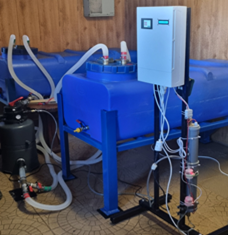The innovative product line for the prevention of mastitis in cows using advanced low-temperature liquid treatment processes and the technology and equipment developed by Amiagus UAB (Ltd) is one of the solutions developed by the company in cooperation with Lithuanian and foreign specialists and scientific institutions in various fields. The essential components of the equipment for low-temperature plasma treatment are protected by patents and know-how is also used for the production of these components. The product line for the prevention of mastitis in cows consists of:
1. Plasma Activated Water (PAW) for watering;
2. Plasma Activated Saline (PAS) for injection;
3. Plasma Treated Oil Mixture (PTO) for surface use.
PAW equipment operating on the farm

The effectiveness of these products is based on the generation of oxygen and nitrogen reactives by direct (direct plasma treatment) and indirect (gaseous carrier of active compounds) treatment of liquids by a low temperature plasma discharge method. Low-temperature plasma is a new non-thermal technology with applications in a wide range of industries, including medical and veterinary applications. Low-temperature plasma consists mainly of ions, electrons, ultraviolet photons, atoms, molecules and free radicals. The reactive oxygen and nitrogen species produced during the processing of products by the low temperature plasma method have a scientific and practical impact on microbiological contaminants, including mastitis agents. The production of plasma-activated oil blends (PTOs) also involves the activation and improved uptake of bioactive oil components, which leads to even greater efficiency.
The main causative agents of infectious mastitis are Staphylococcus aureus, Streptococcus agalactiae and Mycoplasma bovis. Environmental mastitis agents include a wide range of organisms such as coliforms (Escherichia coli, Klebsiella, Enterobacter and Citrobacter), environmental streptococci (Streptococcus uberis and Streptococcus dysgalactiae), Trueperella pyogenes, staphylococcus aureus (NAS), and others, such as Pseudomonas, Proteus, Serratia, Aerococcus, Listeria, Yeast and Prototheca.
Mastitis agents are affected by the innovative low-temperature plasma discharge equipment and technology developed by Amiagus, precisely controlling the amount and type of active compounds formed during the treatment of water, saline and oil mixtures, regulating the volume and proportions of oxygen and nitrogen active species, as well as the additional activation of biologically active components, avoiding unwanted oxidative and other adverse effects. The treatment process is oriented towards safety and maximum efficiency of the final product.
The activated final product is effective in killing mastitis pathogens, achieving a subclinical mastitis treatment efficacy of about 99% with five days of use. Clinical mastitis treatment regimens have also shown that the clinical symptoms of acute mastitis completely or partially disappear after five days.
The use of this product can significantly reduce the need for antibiotics, improve animal health and milk quality. The product line developed by Amiagus has been tested and its effectiveness has been confirmed in collaboration with Vytautas Magnus University.